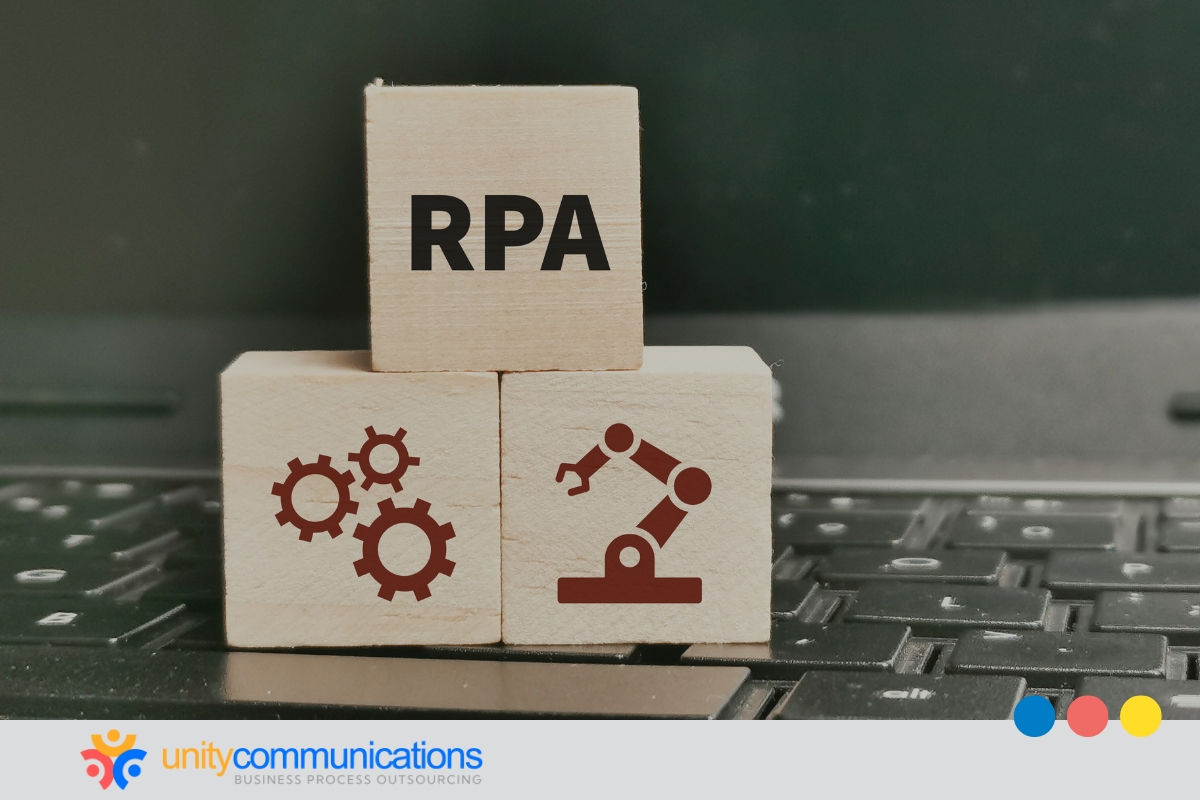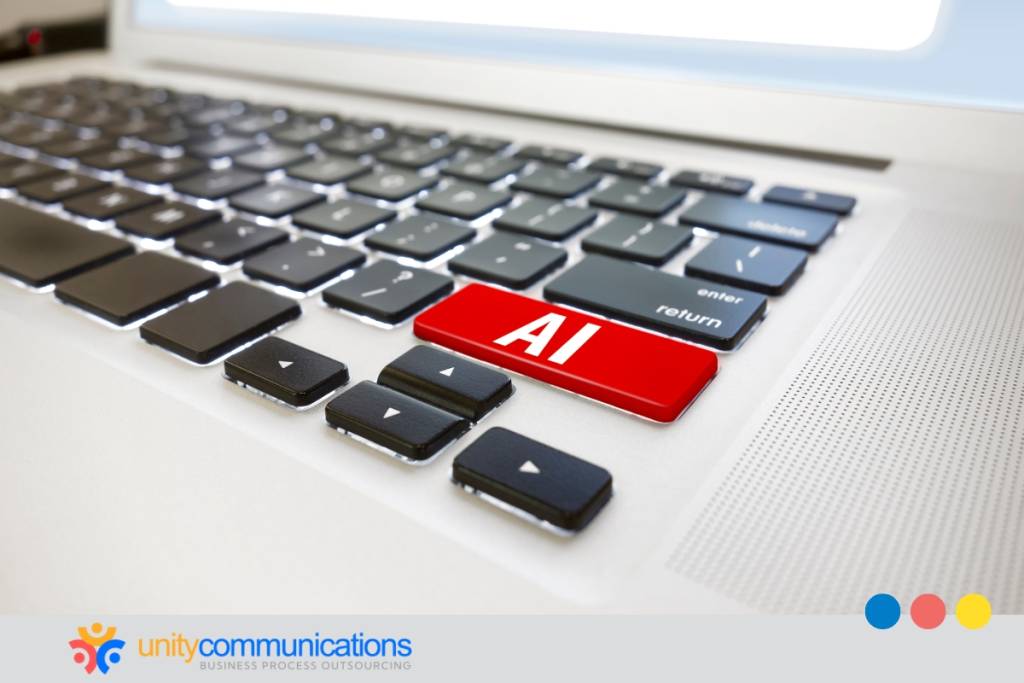IN THIS ARTICLE
Table of Contents
Artificial intelligence (AI) is not merely an additional feature to the business process outsourcing (BPO) framework but a catalyst for transforming how the provider delivers and manages services.
As companies increasingly seek efficiency and innovation, AI is driving a new paradigm known as intelligent outsourcing. This shift—characterized by enhanced automation, sophisticated data analytics, and improved customer experiences—contributes to more agile and responsive business operations.
This article explores how the BPO landscape is being revolutionized by artificial intelligence integration. Read on to learn AI’s impact on streamlining processes, elevating service quality, and redefining roles within BPO.
BPO and the transformative impact of artificial intelligence integration

AI is reshaping every industry it touches. In the BPO sector, AI and machine learning (ML) are making significant inroads, from advanced data analytics to automated customer service. With the AI market value projected to surge from $214.6 billion in 2024 to an impressive $1.339 trillion by 2030, the drive to incorporate AI systems is becoming increasingly irresistible.
As with many other sectors, the BPO industry is rushing to automate routine tasks to free up human resources for more strategic activities, enhance operational efficiency, and reduce costs. Implementing AI is a technological upgrade and a strategic move to convert challenges into competitive advantages.
Here’s a closer look at how BPO is being transformed by artificial intelligence integration.
Automated customer support
In the BPO industry, artificial intelligence integration enhances customer support through advanced chatbots and virtual assistants that provide instant, round-the-clock responses to common questions and issues.
AI-driven tools utilize natural language processing (NLP) to understand and interact with customers in a more human-like manner, improving response accuracy and efficiency. Access to AI allows human agents to manage complex and nuanced customer interactions effectively, leading to a 14% productivity increase and higher overall customer satisfaction.
Automation accelerates support processes and reduces operating costs while maintaining a high level of service quality.
Predictive analytics
In the BPO industry, artificial intelligence integration transforms operations by analyzing historical and real-time data to forecast customer behavior and trends. This allows BPO companies to anticipate customer needs, personalize interactions, and optimize resource allocation.
For example, predictive analytics can help forecast peak times for adequate staffing and efficient service delivery. Leveraging these insights enhances decision-making, improves operational efficiency, and delivers a more tailored customer experience, driving higher satisfaction and cost savings.
Process automation
AI-powered process automation in the BPO industry streamlines repetitive and rule-based tasks, such as data entry, invoice processing, and report generation, through robotic process automation (RPA) technologies.
AI reduces manual effort, minimizes errors, and accelerates the completion of routine tasks. This increases operational efficiency and allows human agents to focus on more strategic and complex activities.
The result is a more agile and cost-effective BPO operation, with enhanced accuracy and productivity across various business processes.
Performance analysis
In the BPO industry, artificial intelligence integration enhances performance analysis by offering real-time monitoring and in-depth insights into agent performance and operational metrics. AI technology continuously monitors interactions between agents and customers, evaluating response times, resolution rates, and compliance with quality standards.
Advanced analytics identify patterns and trends, highlighting areas where performance excels or falls short. This detailed analysis enables BPO firms to pinpoint specific strengths and weaknesses for targeted interventions and training.
Additionally, AI helps track performance over time, providing valuable benchmarks for ongoing improvement. By leveraging these insights, BPO providers can enhance overall efficiency, maintain high service standards, and drive continuous improvement, delivering better outcomes for clients and customers.
Fraud and anomaly detection
BPO firms utilize artificial intelligence integration to enhance fraud and anomaly detection. They analyze large volumes of data to identify unusual patterns and behaviors that might indicate fraudulent activities. AI algorithms continuously monitor real-time transactions and interactions using ML.
Such a proactive approach enables BPO vendors to swiftly address potential security threats, prevent financial losses, and safeguard sensitive information to maintain the integrity and trustworthiness of their operations.
Benefits BPO firms gain from artificial intelligence integration

The IBM Global AI Adoption Index reveals that 35% of businesses worldwide currently use AI, with another 42% exploring its integration. Success in this evolving landscape hinges on fostering a collaborative relationship between humans and AI.
This collaboration is possible by incorporating AI across different facets of the BPO industry, including customer support, back-office operations, and innovation. By harnessing the combined capabilities of humans and AI, organizations can achieve exceptional efficiency, adaptability, and service quality, benefiting all involved parties.
Here are the benefits of using AI in the BPO industry:
- Increased efficiency: AI automates routine and repetitive tasks, such as data entry and processing, allowing BPO companies to handle larger volumes of work more quickly and accurately.
- Improved accuracy: AI systems reduce human error in data handling and decision-making, leading to more accurate and reliable outcomes.
- Enhanced customer experience: AI-driven tools such as chatbots and virtual assistants provide instant, 24/7 support, improving response times and customer satisfaction by addressing questions and issues promptly.
- Better performance monitoring: AI tools continuously monitor and analyze performance metrics, providing real-time feedback and insights that help improve operational efficiency and service quality.
- Personalization: AI enables personalized customer interactions by analyzing data to tailor responses and recommendations, leading to a more customized and engaging customer experience.
- Job creation and skill enhancement: AI also creates new opportunities for roles focused on managing, developing, and optimizing the technology. Training and development programs also empower employees to acquire new skills in data analysis, ML, and AI management.
BPO challenges in artificial intelligence integration
Despite the many benefits, BPO companies encounter several challenges during artificial intelligence integration. Addressing these issues proactively can help organizations adopt and maximize the technology’s benefits.
Here are some challenges to be aware of:
- Implementing AI often requires significant upfront investment in software, hardware, and training, which can be a barrier for some companies.
- Integrating AI with legacy systems and processes can be complex and time-consuming, potentially disrupting operations.
- Effective AI relies on high-quality data. Ensuring data accuracy and protecting sensitive information from breaches are critical concerns.
- Employees might resist adopting new AI tools due to fear of job displacement or discomfort with the latest technologies, necessitating effective change management strategies.
- Successful AI integration requires specialized skills in data science, ML, and AI management, which the current workforce might lack.
- Navigating legal and regulatory requirements related to AI usage, data privacy, and ethics can be challenging and varies by region.
- Ensuring that AI solutions can scale with business growth and adapt to changing needs is crucial for long-term success.
- Relying on external vendors for AI solutions can create dependency issues and potential challenges with support and customization.
What is BPO’s role in addressing these potential challenges in artificial intelligence integration? BPO companies can carefully plan AI strategies and invest in robust change management practices. This includes setting a clear vision for AI implementation and budgeting costs for initial investments and ongoing maintenance.
Integrating AI with the infrastructure requires meticulous planning and possibly upgrading legacy systems for compatibility. Companies must also focus on data quality by implementing stringent data management practices and providing robust security measures to protect sensitive information.
To overcome skill gaps, investing in employee training is essential. Staying informed about relevant laws and incorporating legal advice into the AI strategy can also help manage regulatory and compliance issues.
Businesses can address scalability by choosing flexible AI solutions and adapting the technology to meet evolving needs. Lastly, BPO companies can consider building in-house expertise and establishing clear terms for support and customization with external vendors to mitigate vendor dependence.
The bottom line

BPO and artificial intelligence integration present significant opportunities for innovation, efficiency, and enhanced customer satisfaction. To maximize AI’s potential, BPO companies must balance human expertise with AI-driven automation through a collaborative approach.
Addressing challenges and ethical concerns involves creating a hybrid workforce strategy, investing in training and upskilling, and maintaining open communication. The future of outsourcing depends on the seamless partnership between humans and AI, fostering progress and advancing the industry.
Want to learn more about outsourcing? Let’s connect!





